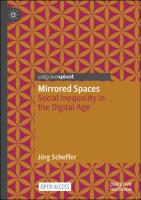Mirrored Spaces
Social Inequality in the Digital Age
Abstract
This open access book critically examines discussions on digitalisation and individual opportunities for socio-economic advancement. Contrary to the prevailing narratives of “digital empowerment” and opportunities for every individual, this book argues that digitalisation massively curtails social advancement opportunities, consolidating existing social relations. From a spatial perspective, Scheffer demonstrates how socially disadvantaged groups are faced with reproducing mechanisms as part of a new data economy. Surprisingly, the more intensively digital services are used, the more this happens. Building on Löw´s sociology of space and Bourdieu´s concept of habitus, this book shows how practices of social exclusion are transferred to the digital present in an innovative way. The image of “mirrored” spaces describes a new mechanism that explains social exclusion in the age of digitalisation. This book is an essential resource for researchers and students interested in socio-economic inequalities, processes of digitalisation, and digital geographies.
Keywords
Social Space; Digital Geographies; Social Reproduction; Filter Bubble; Digital Divide; Data Economy; Socio-economic inequality; DigitalizationDOI
10.1007/978-3-658-42793-1ISBN
9783658427931, 9783658427924, 9783658427931Publisher
Springer NaturePublisher website
https://www.springernature.com/gp/products/booksPublication date and place
Wiesbaden, 2024Grantor
Imprint
Palgrave MacmillanSeries
Geographies of Media,Classification
Human geography
Social issues & processes
Sociology
Society & social sciences
Literature: history & criticism


 Download
Download Web Shop
Web Shop